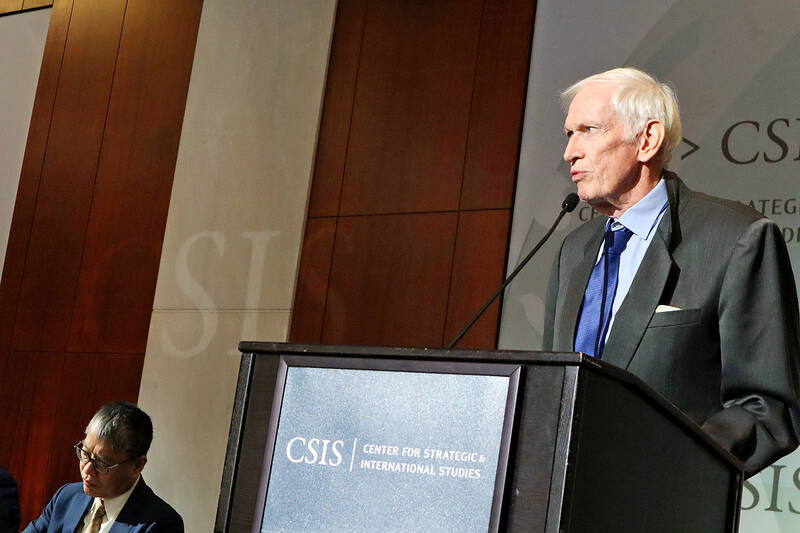China’s “Anti-Secession” Law is a “ticking time bomb,” former American Institute in Taiwan (AIT) chairman James Moriarty said in Washington on Tuesday.
Moriarty made the remarks during a panel discussion entitled “Employing ‘Non-Peaceful’ Means Against Taiwan: The Implications of China’s Anti-Secession Law,” cohosted by the Center for Strategic and International Studies think tank and the Taiwan-based Prospect Foundation.
The 2005 “Anti-Secession” Law is China’s legal basis for punishing Taiwanese desires for independence, the panel said, as Article 8 reserves the right for China to resort to force to “unify” with Taiwan if the possibility of peaceful “reunification” is ever lost.

Photo: CNA
China on June 21 published 22 new guidelines that allow its courts to try in absentia and sentence to death “Taiwanese independence separatists.”
Moriarty called the law “a horrible thing” and said that it “asserted a sovereignty over Taiwan” that the People’s Republic of China lacks.
Article 8 allows China to decide when the hope of “unifying” with Taiwan has been lost, he said.
In giving context to the period when the law was passed, Moriarty admitted that former president Chen Shui-bian (陳水扁) did “have us scared” when he attempted to push for a referendum for Taiwan to enter the UN, which could have unilaterally altered the status quo in the Taiwan Strait, a situation opposed by the US.
Moriarty said that the situation has now changed and that on his recent visit to Taiwan, there was no evidence that the nation was moving toward independence under three consecutive Democratic Progressive Party presidential terms.
When bringing up the potential for a peaceful, non-coercive unification between the two sides of the Strait, he said he “certainly” does not see it in the foreseeable future, citing global events such as the Hong Kong protest movement and the war in Ukraine, that have provided lessons for Taiwanese voters.
Given Taiwan’s democratic system, the “well-informed electorate” is “in control” of any unification process, Moriarty said.
While Taiwan has changed in the past two decades, China is no longer flexible or “willing to kick the can down the road” as it was under former Chinese presidents Hu Jintao (胡錦濤) and Jiang Zemin (江澤民), he said.
The new guidelines have put pressure on the Chinese authorities to act against Taiwanese independence and that under one-man rule, China has become increasingly unpredictable.
“We don’t want [Chinese President] Xi Jinping (習近平) to wake up one day and say ‘today is the day we can make it work’” he said about a potential invasion of Taiwan.
He called for other nations to provide an effective deterrent and to do so quickly, so that Xi would choose not to start a war, and to push back against legislation such as the “Anti-Secession” Law.

The Ministry of Education (MOE) is to launch a new program to encourage international students to stay in Taiwan and explore job opportunities here after graduation, Deputy Minister of Education Yeh Ping-cheng (葉丙成) said on Friday. The government would provide full scholarships for international students to further their studies for two years in Taiwan, so those who want to pursue a master’s degree can consider applying for the program, he said. The fields included are science, technology, engineering, mathematics, semiconductors and finance, Yeh added. The program, called “Intense 2+2,” would also assist international students who completed the two years of further studies in

Former president Tsai Ing-wen (蔡英文) departed for Europe on Friday night, with planned stops in Lithuania and Denmark. Tsai arrived at Taiwan Taoyuan International Airport on Friday night, but did not speak to reporters before departing. Tsai wrote on social media later that the purpose of the trip was to reaffirm the commitment of Taiwanese to working with democratic allies to promote regional security and stability, upholding freedom and democracy, and defending their homeland. She also expressed hope that through joint efforts, Taiwan and Europe would continue to be partners building up economic resilience on the global stage. The former president was to first

Former president Tsai Ing-wen (蔡英文) on Monday called for greater cooperation between Taiwan, Lithuania and the EU to counter threats to information security, including attacks on undersea cables and other critical infrastructure. In a speech at Vilnius University in the Lithuanian capital, Tsai highlighted recent incidents in which vital undersea cables — essential for cross-border data transmission — were severed in the Taiwan Strait and the Baltic Sea over the past year. Taiwanese authorities suspect Chinese sabotage in the incidents near Taiwan’s waters, while EU leaders have said Russia is the likely culprit behind similar breaches in the Baltic. “Taiwan and our European

The Taipei District Court sentenced babysitters Liu Tsai-hsuan (劉彩萱) and Liu Jou-lin (劉若琳) to life and 18 years in prison respectively today for causing the death of a one-year-old boy in December 2023. The Taipei District Prosecutors’ Office said that Liu Tsai-hsuan was entrusted with the care of a one-year-old boy, nicknamed Kai Kai (剴剴), in August 2023 by the Child Welfare League Foundation. From Sept. 1 to Dec. 23 that year, she and her sister Liu Jou-lin allegedly committed acts of abuse against the boy, who was rushed to the hospital with severe injuries on Dec. 24, 2023, but did not